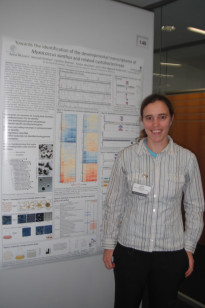

Office Hours
Dr. McLoon joined the Department of Biology at Siena College in 2017. She completed her PhD in genetics at Harvard University in 2011. Prior to joining the Biology Department at Siena, Dr. McLoon spent time teaching and conducting research at Colgate University, Regis University, and the Max Planck Institute for Terrestrial Microbiology in Marburg, Germany.
| Degree | Program | University |
|---|---|---|
| Ph.D. | Harvard University | |
| B.A. | Biochemical sciences | Harvard University |
My Siena Experience
My Teaching Philosophy
My favorite question is how. How does cholera make people sick? How come it spreads so quickly in refugee camps? How can understanding these answers help us fight this disease more effectively? How did scientists arrive at the theories and conclusions that we discuss in class?
By asking and answering "How" questions, we can build a much more accurate understanding of how living organisms grow and interact with one another and their environment. I also know that this accurate understanding of "how" can help us learn how to harness biology to improve human and environmental health, so I encourage students to make connections between what we are learning in the classroom and pivotal issues in global society.
What I Love About Siena
For me as a professor, I enjoy getting to work with students who are willing to work hard and interested in learning. The small classes we have at Siena means that I get to spend time with every single student during a lab, so that I can get to know my students and make sure that they all get the most out of each class. Also, here at Siena we have amazing resources from the fluorescence microscopes that students get to use regularly in cell biology lab, the extensive equipment available in the SAInT center for more advanced projects. This means our students gain many skills that can prepare them for a wide range of careers in biology.
My Professional Experience
Current Research
How did multicellular life evolve on this planet, and what were the early benefits of multicellularity long before organisms evolved eyes and feet? By studying how individual cells within communities of unicellular bacteria interact and communicate to create large and organized structures, we can learn basic principles about the costs and benefits of multicellular lifestyles.
My research currently takes 2 different approaches to explore this bigger topic:
1. Using laboratory evolution experiments, I test how changing conditions in the laboratory can change the way one well studied species of bacteria, Bacillus subtilis, forms multicellular structures.
2. By exploring similarities and differences between different species of bacteria that form complex fruiting bodies, I try to identify specific proteins involved in the formation of these multicellular structures.